Fortress Press Paul Collection (16 vols.)
Digital Logos Edition
Overview
The Apostle Paul hardly needs introduction as one of the most influential and faithful believers of all history. An educated and religious Pharisee, he persecuted Christians until converted on the road to Damascus. He spent the rest of his life preaching, teaching, traveling, and writing letters to churches, which became most of the New Testament. Paul was persecuted and tortured wherever he went, finally being martyred in Rome. His teachings form much of the basis for all Christian thought and living. They have been discussed, fought over, and lived out for over two thousand years. This impressive collection includes sixteen volumes with over twenty-five scholarly contributors, including eminent author, Neil Elliott. The Fortress Press Paul Collection presents some of the most compelling thinking on the life of Paul, as well as the influence of his theology on Christianity and the Western World.
The Fortress Press Paul Collection (16 vols.) contains a wide variety of issues concerning Paul and his life and theology. There are biographies, studies on his theology, and current impact of his teaching on modern issues. There are also comparisons of Paul’s teachings with other philosophies as well as critical literary analyses. Included are volumes that deal with cultural, geographical, and historical contexts, as well as maps and charts. This is an invaluable collection for any scholar, professor, or anyone wanting to learn more about the life, teaching, and discussion of Christendom’s most well-known apostle.

- Overview of the Apostle Paul’s life and theology
- Systematic analysis of Paul’s teaching and influence on Christianity
- Scholarly yet accessible accounts to guide and inform research and understanding.
- Title: Fortress Press Paul Collection
- Publisher: Fortress Press
- Volumes: 16
- Pages: 3,398
- Approaches to Paul by Magnus Zetterholm
- Reading Romans in Pompeii: Paul’s Letter at Ground Level by Peter Oakes
- Social-Science Commentary on the Letters of Paul by Bruce J. Malina and John J. Pilch
- Liberating Paul: The Justice of God and the Politics of the Apostle by Neil Elliott
- The Arrogance of Nations: Reading Romans in the Shadow of Empire by Neil Elliott
- Christ’s Body in Corinth: The Politics of a Metaphor by Yung Suk Kim
- The Politics of Heaven: Women, Gender, and Empire in the Study of Paul by Joseph A. Marchal
- Galatians Re-Imagined by Brigitte Kahl
- Apostle to the Conquered: Reimagining Paul’s Mission by Davina C. Lopez
- Paul and His World: Interpreting the New Testament in Its Context by Helmut Koester
- The Social Context of Paul’s Ministry: Tentmaking and Apostleship by Ronald F. Hock
- Paul on the Cross by David Brondos
- Paul and the Popular Philosophers by Abraham J. Malherbe
- Cities of Paul, Images and Interpretations: from the Harvard New Testament and Archaeology Project by Helmut Koester
- The Making of Paul: Constructions of the Apostle in Early Christianity by Richard I. Pervo
- Social-Science Commentary on the Book of Acts by Bruce J. Malina and John J. Pilch
This title is included in the following collections
You can save when you purchase this product as part of a collection.
Fortress Press Pauline Studies...
$444.99$444.99Fortress Press Pauline Studies...
$706.65$564.99
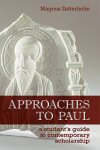
What distinguishes the “new perspective on Paul”—and what lies beyond it? What are scholars saying about Paul and the Roman Empire or about the intersection between feminist and postcolonial interpretation of Paul? Magnus Zetterholm provides a clear and reliable guide to these and other lively issues in the contemporary study of Paul, surveying the history of the principal perspectives on Paul’s relation to Judaism and the Jewish law and showing the relationships between answers given to those questions and the assumptions scholars bring to other issues as well. This is an indispensable handbook for the beginning student of the apostle and his thought.
Magnus Zetterholm is associate professor of New Testament studies at Lund University, Sweden.
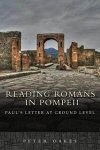
Peter Oakes relies on demographic information and data from excavations in nearby Pompeii to paint a compelling portrait of daily life in a typical insula, or apartment complex, like the ones in which Paul’s audience in Rome likely lived. Imaginatively fleshing out profiles of the circumstances of actual residents of Pompeii, Oakes then uses these profiles to invite the reader into a new way to hear Paul’s letter to the Romans as the apostle’s contemporaries might have heard it. The result of this ground-breaking study is a fuller, richer appreciation of Paul’s most important letter.
Peter Oakes is Greenwood Senior Lecturer in New Testament at the University of Manchester.
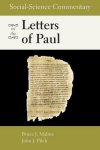
This latest addition to the Fortress Social-Science Commentaries on New Testament writings illuminates the values, perceptions, and social codes of the Mediterranean culture that shaped Paul and his interactions—both harmonious and conflicted—with others. Malina and Pilch add new dimensions to our understanding of the apostle as a social change agent, his coworkers as innovators, and his gospel as an assertion of the honor of the God of Israel.
Bruce J. Malina is professor of New Testament at Creighton University, Omaha, Nebraska.
John J. Pilch is professor of biblical studies at Georgetown University, Washington, DC.
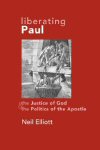
For centuries the apostle Paul has been invoked to justify oppression—whether on behalf of slavery, to enforce unquestioned obedience to the state, to silence women, or to legitimate anti-Semitism. To interpret Paul is thus to set foot on a terrible battleground between spiritual forces. But as Neil Elliott argues, the struggle to liberate human beings from the power of Death requires “Liberating Paul” from his enthrallment to that power. In this book, Elliott shows that what many people experience as the scandal of Paul is the unfortunate consequence of the way Paul has usually been read, or rather misread, in the churches.
In the first half of the book, Elliott examines the many texts historically interpreted to support oppression or maintain the status quo. He shows how often Paul’s authentic message has been interpreted in the light of later pseudo-Pauline writings.
In part two, Elliott applies a “political key” to the interpretation of Paul. Though subsequent centuries have turned the cross into a symbol of Christian piety, Elliott forcefully reminds us that in Paul’s time this was the Roman mode of executing rebellious slaves, a fact that has profound political implications.
Under Elliott’s examination, a startlingly new image of Paul begins to emerge, liberated from layers of false interpretation, and free to speak a liberating and challenging word to our world today.
Neil Elliott, an Episcopal priest, teaches biblical studies at United Theological Seminary of the Twin Cities and Metropolitan State University in Minneapolis.
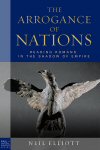
Elliott offers a fresh and surprising reinterpretation of Paul’s letter to the Romans in the context of Roman imperial ideology, bringing to the text the latest insights from classical studies, rhetorical criticism, postcolonial criticism, and people’s history.
By setting the letter alongside Roman texts (Cicero, Virgil, the Res Gestae of Augustus, Seneca, poets from the age of Nero, as well as later historians and satirists), Elliott provides a dramatic new reading of the letter as Paul’s confrontation with the arrogance of empire—and with an emerging Christianity already tempted by the seductive ideology of imperial power. The Arrogance of Nations explores such topics as:
- Empire and the obedience of faith
- Justice and the arrogance of nations
- Mercy and the prerogatives of power
- Piety and the scandal of an irreligious race
- Virtue and the fortunes of peoples
- Paul and the horizon of the possible
Neil Elliott, an Episcopal priest, teaches biblical studies at United Theological Seminary of the Twin Cities and Metropolitan State University in Minneapolis.
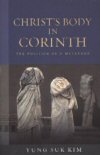
Yung Suk Kim takes up the language of “body” that infuses 1 Corinthians, Paul’s most complicated letter, and the letter that provides us the most information, and poses the sharpest questions, about social realities in the early church. Kim argues against the view that in speaking of the church as Christ’s body Paul seeks to emphasize unity and the social boundary. Against the conventional rhetoric of the “body politic” in Greco-Roman philosophy, Kim argues that Paul seeks rather to nourish the vitality of a diverse community and to criticize the ideology of a powerful in-group in Corinth, a message of particular importance for contemporary global Christianity.
Yung Suk Kim is assistant professor of New Testament and early Christianity at Samuel DeWitt Proctor School of Theology, Virginia Union University, in Richmond, Virginia.
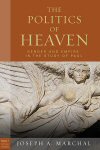
In this provocative study, Joseph A. Marchal argues that biblical interpretation, but most especially Pauline studies, must engage the full range of critical challenges brought by feminist studies, postcolonial studies, and Roman imperial studies. A feminist, postcolonial analysis requires negotiating the gaps, overlaps, and tensions between these three “strands” by adopting an explicitly multiaxial focus and an interdisciplinary methodology. Using Philippians as a test case, the analysis covers issues of both ancient and contemporary import: from imitation and authority to travel and contact. As a result, Marchal provides strikingly new perspectives on Paul’s letters and fresh challenges to the paradigms of Pauline interpretation.
Joseph A. Marchal is assistant professor of religious studies at Grinnell College and the author of numerous articles and papers in feminist and postcolonial interpretation.
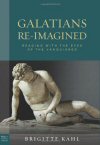
Brigitte Kahl brings to this insightful reading of Galatians a deep knowledge of the classical world and especially of Roman imperial ideology. The first wave of scholarship on the Roman imperial context of Paul’s letters raised important questions that only thorough treatments of individual letters can answer. Kahl sets the letter to the Galatians in the context of Roman perceptions of vanquished peoples as represented in the Great Altar at Pergamum. Beginning with a perceptive discussion of the Great Altar, Kahl describes imperial representations of Roman power as well as the characteristics officially imputed to conquered peoples, including the “savage” Galatians (Gauls).
Brigitte Kahl is professor of New Testament at Union Theological Seminary, New York.
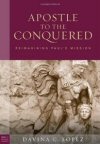
Davina C. Lopez here combines attention to Roman visual and literary representations of conquered nations with a gender-critical “reimagination” of Paul’s apostleship. The result is a new and more critical perspective on the systematic violence of the Roman Empire, and a renewed understanding of “Paul’s politics of the new creation.”
Davina C. Lopez is assistant professor of religious studies at Eckerd College in St. Petersburg, Florida, and serves on the American Academy of Religion’s Board of Directors.
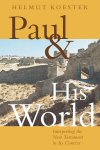
This volume presents critical essays on theology and eschatology in Paul’s letters, the apostle’s religious and cultural context, and the interaction of early Christianity with its Greco-Roman environment, as reflected in ancient literature and archaeological remains.
Helmut Koester is John H. Morison Research Professor of Divinity and Winn Research Professor of Ecclesiastical History at Harvard Divinity School in Cambridge, Massachusetts, and chair of the New Testament Board of the Hermeneia Commentary Series.
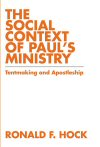
Ronald Hock focuses on the apostle Paul and his work within the social and intellectual context of the Greek East of the early Roman Empire. He discusses the New Testament evidence concerning tentmaking in relation to Paul’s life as an apostle of Christ. Relevant literary and nonliterary texts from outside the New Testament add detail to a picture of ancient society and open new areas for study. The author describes the typical experiences that arose from such a way of life–traveling, the tentmaking trade, the missionary use of the workshop, attitudes toward work, and Paul’s own reflections on the significance of his tentmaking for the apostolic self-understanding.
Ronald F. Hock is professor of religion at the University of Southern California, Los Angeles.
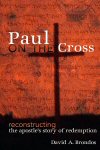
Even as theologians have become more critical of classic theories of atonement, biblical scholars have continued to rely upon such theories as a basis for interpreting Paul’s teaching regarding salvation and the cross. In this vital volume, Brondos looks to the recent advances in New Testament scholarship to argue for an alternative understanding of Paul’s doctrine of salvation and the cross.
Paul, says Brondos, understood Jesus’ death primarily as the consequence of his mission: to serve as God’s instrument to bring about the long-awaited redemption of Israel, in which Gentiles throughout the world would also be included. For Paul, Jesus’ death is salvific not because it satisfies some necessary condition for human salvation, as most doctrines of the atonement have traditionally maintained, nor because it effects some change in the situation of human beings or the world in general. Rather, Jesus’ God responded to Jesus’ faithfulness unto death by raising him, thereby ensuring that all the divine promises of salvation would be fulfilled through him.
Jesus’ death forms part of an overarching story culminating in the redemption of Israel and the world. It is this story, and in particular what preceded and followed Jesus’ death on the cross, that makes that death redemptive for Paul.
David Brondos is professor of theology at the Theological Community of Mexico, an ecumenical consortium of seminaries in Mexico City, where he teaches systematic theology and biblical studies.
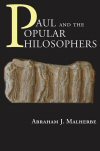
These studies continue a tradition of scholarship that flourished around the turn of the century when new editions of ancient philosophical sources were published. Professor Malherbe, however, widens the scope to include other philosophical traditions. He recognizes and identifies the influences of Platonists, Peripatetics, Cynics, Stoics, Epicureans, and Pythagoreans. These popular philosophers aimed at moral reform; they shared both in their substance and in the techniques employed. Yet, they need to be distinguished in order to discern their influence, if any, on Paul.
Abraham J. Malherbe is Buckingham Professor of New Testament Criticism and Interpretation, emeritus, at Yale University, The Divinity School, New Haven, Connecticut.
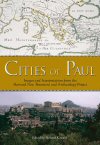
Cities of Paul, Images and Interpretations: from the Harvard New Testament and Archaeology Project
- Author: Helmut Koester
- Publisher: Fortress Press
- Publication Date: 2004
- Pages: 871
This dynamic resource includes nine hundred photographs from sites in Greece and Turkey (ancient Asia Minor) illuminating the religious and civic lives of peoples encountered by Paul and other leaders in the earliest churches. Cities featured include Athens, Olympia, Corinth, Pergamon, Delphi, Philippi, Ephesus, and Thessalonike. In addition to photos, this resource includes maps, bibliographies, and detailed historical information about the sites and artifacts.
Each slide is accompanied by an explanation of the image and the particular elements in the photograph. This stunning array of images and commentary is a powerful teaching and reference tool to bring alive the world of the early Christians for students and laypersons alike.
Helmut Koester is John H. Morison Research Professor of Divinity and Winn Research Professor of Ecclesiastical History at Harvard Divinity School in Cambridge, Massachusetts, and chair of the New Testament Board of the Hermeneia Commentary Series.
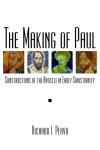
The Making of Paul: Constructions of the Apostle in Early Christianity
- Author: Richard I. Pervo
- Publisher: Fortress Press
- Publication Date: 2010
- Pages: 400
The influence of the apostle Paul in early Christianity goes far beyond the reach of the seven genuine letters he wrote to early assemblies. Paul was revered–and fiercely opposed–in an even larger number of letters penned in his name, and in narratives told about him and against him, that were included in our New Testament and, far more often, treasured and circulated outside it. Richard Pervo provides an illuminating and comprehensive survey of the legacy of Paul and the various ways he was remembered, honored, and vilified in the early churches. Numerous charts and maps introduce the student to the “family” of Pauline and anti-Pauline Christianities.
Richard I. Pervo, retired professor of New Testament and Christian studies at the University of Minnesota, is author of Rethinking the Unity of Luke and Acts, and most recently, Dating Acts: Between the Evangelists and the Apologists.
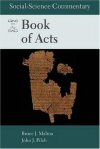
Social-Science Commentary on the Book of Acts
- Authors: Bruce J. Malina and John J. Pilch
- Publisher: Fortress Press
- Publication Date: 2008
- Pages: 254